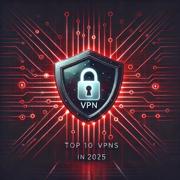Beyond Dawlish
Can Best VPNs Protect Your Privacy in 2025?
In an era wherein digital privacy issues are escalating, Virtual Private Networks (VPNS) have grown to be a popular tool for individuals seeking to protect their online privacy. As technology advances and cyber threats evolve, many are surprised: Are Top 10 VPNs even powerful in protecting privacy in 2025? This article explores the present-day capabilities of VPNS, their obstacles, and whether they remain a reliable guard of your virtual privacy in the coming years.
Understanding VPNS and How They Work
A VPN creates a secure, encrypted tunnel between your device and a far-off server operated by way of the VPN provider. When you join through a VPN, your internet traffic is routed via this server, protecting your IP address and encrypting your data. This system facilitates saving you from third parties, together with ISPS, hackers, or authority groups, from monitoring your online activities.
The core promise of a VPN is privacy and safety: hiding your real IP address, encrypting your data, and bypassing geo-restrictions. For many clients, VPNS are crucial equipment for keeping anonymity, securing sensitive information, and gaining access to content freely.
The State of VPN Privacy in 2025
1. Encryption Standards and Technological Advancements:
By 2025, encryption technology will have persisted to adapt. Most reliable VPN providers make use of superior encryption protocols like AES-256, which may be considered secure towards current computational abilities. Quantum computing, however, offers a destiny project; even as quantum-resistant encryption is in development, large-scale implementation is still rising.
Implication: Today’s VPN encryption stays sturdy, however, the possibility of quantum decryption in the future ought to necessitate new standards. For now, VPNS preserve to correctly comfy your facts closer to conventional threats.
2. Logging Policies and Data Retention Laws:
One of the maximum essential privacy troubles with VPNS is whether or not they keep logs of individual activities. Some companies preserve strict no-logs regulations, which means they do not record your surfing records or connection statistics. Others, mainly the ones going for walks in jurisdictions with data retention laws, might also log customer interests, each legally forced or for business purposes.
In 2025, the focus on privacy regulations will be better. Many Best VPNs services have adopted transparent, no-logs rules, and 1/3-birthday party audits affirm their claims. However, selecting a sincere provider is essential.
Implication: Your privacy’s effectiveness depends on your VPN organisation’s regulations. Using a validated no-logs VPN significantly complements your privacy protection.

3. Government and Legal Surveillance:
Governments globally have increased surveillance capabilities, frequently justified with the aid of way of country-wide protection issues. Some jurisdictions require VPN carriers to preserve facts or cooperate with authorities. While the usage of VPNS is crook in many countries, restrictions have multiplied in some areas, and government surveillance programs are superior.
In 2025, VPNS can nonetheless provide a layer of privacy, however, their efficacy varies based on local laws and enforcement. In extensively restrictive regimes, VPNS may be blocked or monitored, decreasing their effectiveness.
Implication: VPNS are an effective privacy system, but in oppressive regimes, their potential to protect your anonymity can be compromised.
4. Risks of VPN Providers as Potential Threats:
While VPNs protect customers from outside threats, they can also pose dangers if the provider is untrustworthy. A malicious or compromised VPN company may additionally need to log consumer activity, inject malware, or leak data.
In 2025, the significance of selecting legit carriers that prioritise protection and transparency remains paramount. Open-deliver VPN clients and impartial audits are signs of honest providers.
Implication: Your VPN’s protection hinges on the company’s integrity and safety practices. Always research and pick reliable VPN services.
Best Practices for Maximizing Privacy with VPNs in 2025
To make sure your VPN affords the most privacy protection:
Choose a Reputable, No-Logs VPN Provider: Prioritise vendors with transparent hints, independent audits, and first-rate reputations.
Use Secure Protocols: Opt for VPN protocols like WireGuard or IKEv2/IPSec, which balance protection and speed.
Enable Leak Protection: Activate DNS and IP leak safety abilities provided with the resources of your VPN subscription.
Keep Software Updated: Regularly replace your VPN app and device software to patch vulnerabilities.
Combine with Other Privacy Tools: Use privacy-targeted browsers (like Tor or Brave), ad blockers, and anti-tracking extensions.
Be Aware of Local Laws: Understand the legal landscape regarding VPN use for your use. To keep away from inadvertent violations.
The Bottom Line: Are VPNS Still Effective in 2025?
In brief, VPNS remains a precious device for reinforcing online privacy in 2025. They offer strong encryption, assist masks of your IP address, and can steer clear of censorship and geo-restrictions. However, their effectiveness relies closely on deciding on legitimate vendors, properly configuring the company, and understanding their limitations.
While VPNS substantially increases your privacy, they no longer guarantee anonymity or safety. They ought to be part of a broader privacy strategy that includes ease of browsing, sturdy passwords, and careful sharing of private records.
Final Thought:
VPN generation is evolving, and so are privacy threats. In 2025, staying informed about improvements, selecting trustworthy services, and mixing multiple privacy tools may be crucial to maintaining control over your digital footprint. When used accurately, Top VPNs in 2025 are a powerful factor for your privacy toolkit, supporting you to navigate the complicated digital landscape with more self-warranty and protection.














